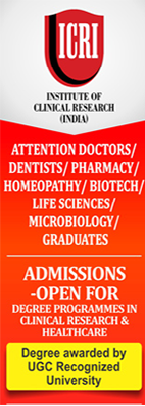Healthcare is one of the fastest growing industries in terms of revenue and employability.In the last few years, India has become one of the major destinations for medical tourism. With a great demand for quality healthcare services and facilities and an inflow of patients from all over the world – there is a growing need for healthcare management professionals.
Healthcare is not just about doctors and nurses anymore. Healthcare consists of hospitals, medical devices, clinical trials, outsourcing, telemedicine, medical tourism, health insurance and medical equipment. Such transitions in the healthcare industry have made healthcare management as a promising career option.
What does a healthcare manager do?
A healthcare manager caters to all the administrative requirements of a medical organisation. There can be several job opportunities in the areas of staffing, accounting, planning, marketing, public relations, human resource management, health insurance, medical colleges, etc. A healthcare manager is responsible for the delivery of best possible services in the most economic manner, and the optimum utilisation of resources.
Can doctors be healthcare managers?
The credit for the success of an organisation goes to its leader, and a good leader is someone who understands the business well and drives a team together. There have been various studies all over the world, which showed that the hospital quality scores are approximately 25% higher in doctor-run hospitals than in manager-run hospitals. These studies also found that it is the proportion of managers with a clinical degree that had the largest positive effect. Having trained in looking through the patient-focused lens, doctors moving in the executive positions are more likely to bring a patient-focused strategy. Strategic governance of a hospital works better if it is managed by a doctor as they understand the insights into the needs of employees better than a manager. As they are the insiders of the business, they understand the balance of quality against cost. In order to make doctors and clinicians a healthcare manager, they need to be trained more systematically.
MBA in Healthcare Management
An MBA in Healthcare Management opens a door for various career options and can be pursued by students with a background in science, medicine, physiotherapy or other related fields. MBA in Healthcare Management is befitting for those interested in Pharmaceuticals sector, government agencies, insurance organisations, hospitals and consulting firms in the health sector.
The absorption rate of MBA in Health Management Degree holders is higher than other clinical degrees. The average salary packages may range between 4.5 lakhs to 12 lakhs per annum and can reach up to 25 lakhs per annum.
What does the course curriculum look like?
A typical MBA course takes place over two years, with a perfect combination of classroom lectures, case studies analysis, workshops for skill enhancement, industrial Visits, projects, and training programs. The course structure comprises of – Financial management, Marketing and Human Resource management, Hospital Operations management, Customer Relations, Biomedical Waste management, and Patient Care Services among other modules that train a physician to be a proficient manager.Students also get an opportunity to earn while they are studying. They can join medical institutions as trainees and grow professionally. This course is apt for those who are looking for a career in the healthcare industry and want to enter at mid-senior level.
While there are a lot of colleges that provide this course, one such institute is Institute of Clinical Research (India), fondly known as ICRI in Bangalore.
About ICRI
ICRI is a premier institute focused on providing specialised clinical research programs.We have a team of well-qualified and experienced faculty, who are either academicians or eminent professionals from the Pharmaceutical Industry. ICRI’s objective is to uplift the development of clinical research in India.ICRI offers a full-time two years MBA in Healthcare Management from a UGC recognised university. What sets us apart from other institutions offering the same course is that we provide a Post Graduate Diploma in Hospital Management post the completion of the first year and are the only institute in the country to provide this certificate along with practical work experience at Narayana Hrudayalaya Hospital, Bangalore. ICRI not only provides a degree and professional skills but also opens an avenue for new opportunities and growth for students and professionals.



